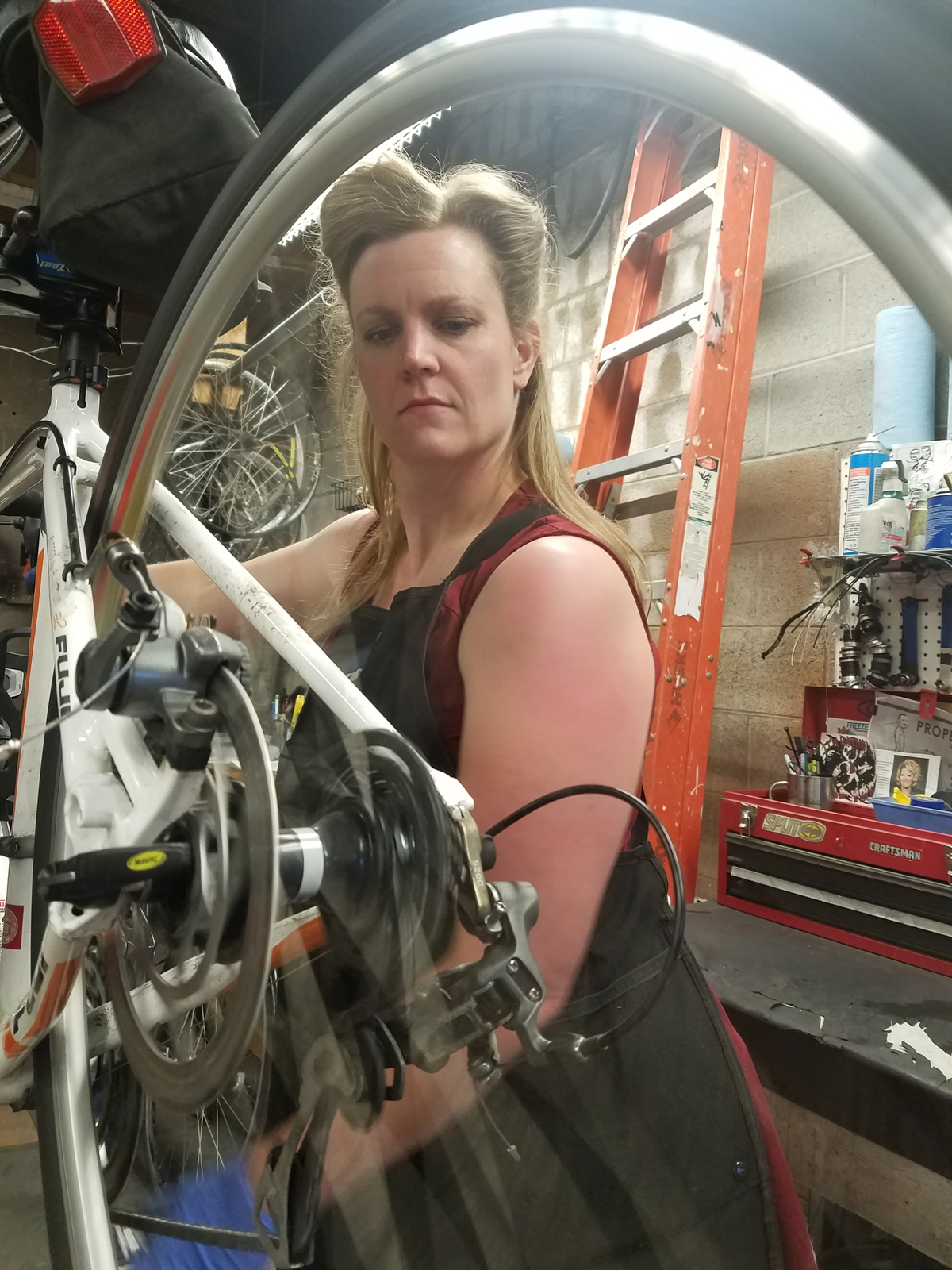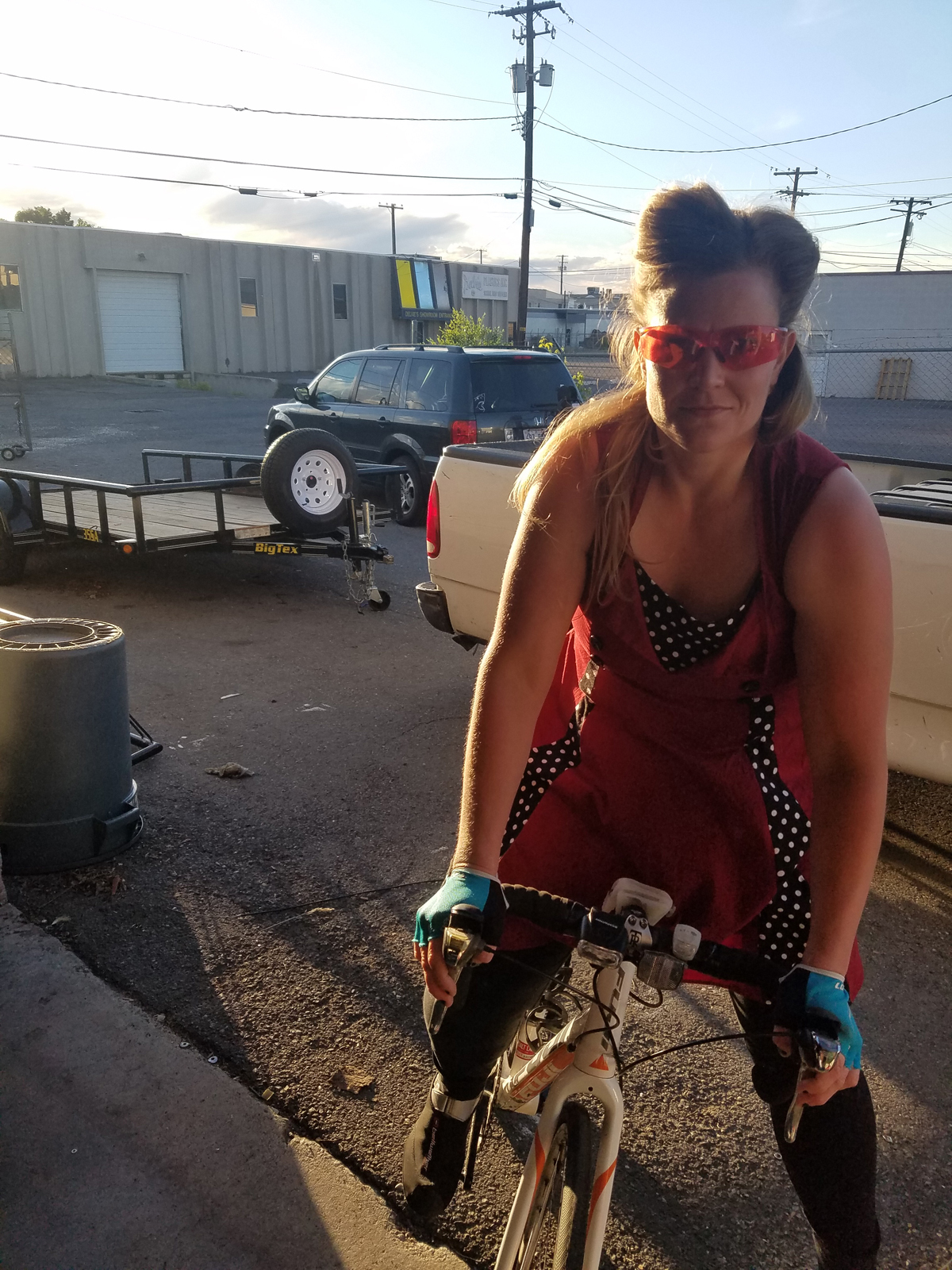By Lou Melini — I met Mollie shortly after I became a volunteer at the Salt Lake Bicycle Collective. Mollie has helped me out on several occasions when a mechanical problem was in need of professional advice. Always with a smile on her face, Mollie is an essential part of the team at the Collective.
[Editor’s note: this profile was originally written and published in 2017.]
Cycling West: Mollie, tell me a little about yourself
Mollie Bourdos: I am currently one of two female mechanics at the Bicycle Collective, but I didn’t start out that way. I was always drawn to people, Psychology in particular, so I completed a Bachelor of Science degree in Psychology, a Bachelor of Science degree in Sociology and a certificate in Criminology from the University of Utah. I quickly went to work with troubled youth, and accepted the high-stress environment that I had chosen. It didn’t take me long to realize that I couldn’t handle the pressure of my career long term. Needless to say, I “burned out” as they say in my field of work. I was wandering, and looking for a new career path. I wasn’t sure what to do, but I ended up at the Collective. My life has been forever changed for the positive, and I haven’t looked back since.

C.U.: I assume that you did quite a bit of cycling to spur your interest to be a bike mechanic?
M.B.: I started biking as a way to relieve stress, get exercise, and spend time with my father. My father and I used to bike together when I was younger. He had recently decided to get back into cycling so I decided to join him on his 7.5-mile ride one morning. One week of riding with him that became three times a week, and I was hooked on cycling again. Soon I had convinced him to up our ride to every day, and then eventually to ten miles every day. I even got him to commit to a fifty-two mile ride around Bear Lake (something we used to do every year when I was younger). I even convinced my husband to join me riding. Pretty soon I was riding ten miles a day with my father, and then five miles a day with my husband. It didn’t take me long to realize it was more convenient for me to ride fifteen miles once a day instead of splitting up my rides. The three of us completed the fifty-two mile Bear Lake ride about the time that my father turned seventy-three.

C.W.: Those rides with dad took you from your previous career to the Collective.
M.B.: I was trying to decide what I wanted to do with the rest of my life. I was sitting in a hotel room while on vacation with my husband, and it hit me. I wanted to be a bicycle mechanic. I have always been very handy. I grew up with a father who taught me to do what I could for myself. We do woodworking together, I work on my own motor vehicles, and I do minor home improvement jobs. It seemed like a natural progression that I would learn how to wrench on bicycles. So the hunt started. I visited my local bike shops in Sandy and Draper. I was laughed at, ignored, and turned away. At one of the last shops I tried, a female employee asked me if I had heard about the Bicycle Collective. She gave me the website, and told me about their apprenticeship program. I applied, and was accepted, within the next week.
C.W.: I have been offered to consider the Apprenticeship program but I decided to wait. Tell me about it.
M.B.: I was an apprentice for about six months. However, I should note that I did my apprenticeship full time. I devoted forty hours a week to learning how to be a bicycle mechanic. It is not realistic to think most people can do it in the short of a time period. The apprenticeship was self -guided, so everyone’s pace was different. There are many different levels, and I was fortunate enough to be able to shadow the head mechanic for the conclusion of my apprenticeship. After six months, I was offered a permanent position as a junior mechanic at the Collective. It has been a year and a half since I began my apprenticeship and now my employment. I am now a senior mechanic, and one of only two female mechanics on staff.
C.W.: Did the Collective inspire you to take your riding further by commuting to work?
M.B.: I realized that everyone that worked at the Collective commuted to work, so I set out to do the same. However, most of those employees lived considerably closer to the Collective than I did. I decided to drive to a location about halfway to the Collective, and cycle from there and back. This was still a fifteen-mile circuit. I did this for about six months, and then I decided that I was ready to try the entire thirty- mile ride. I commute from Sandy to South Salt Lake. To prepare, I packed a multi-tool, a patch kit, a bike pump, and extra tube, and lots of water. I also checked the schedule for the local Trax line, in case I was unable to make the full thirty miles. I got my road bike ready, and gave it a shot. I needed the right tires, and the right riding wear. The first ride home was tough. I didn’t want to do it after a full day of work, but I thought I’d try it anyway. I was so proud of myself after I made it, that I tried it again the next day. I haven’t looked back since. That doesn’t mean I don’t have days that I don’t ride, or that I’m not tired. It just means that I do my best to ride every day.
As time went on, I realized that I needed to prepare for different conditions. I now have seven bikes that I have built up over the last year and a half, but that does not mean that everyone needs that many bikes to commute. All you really need is one good commuter, and you can get around on a bicycle all year long. I have bikes with and without fenders, racks, studded tires, thin slicks, panniers, disc brakes and rim brakes all on a variety of steal and aluminum frames so I can have many different options.
C.W.: What are some general tips you would give to someone considering commuting to work by bicycle?
M.B.: As I mentioned before, all you need is one good commuter bike, and you’re set. Look for something comfortable and fairly upright. You definitely want fenders and a rack. Most importantly, don’t forget a good lock. We at the Collective recommend a U-lock. These seem to be the best locks on the market, and yet they still aren’t full proof. I use a U- lock and a cable lock when locking my bike up. As a wonderful, and smart woman once told me: the more locks you have, the harder your bike looks to steal. I want my bike to look like it’s not worth the effort to steal, and I recommend the same to all commuters.
I also recommend riding with a friend, if that is an option. If you don’t have someone to ride with, ask others who ride to give you pointers on what routes to safely take. People are your best resource. If you don’t know anyone who rides, you can come to the Collective, and ask a commuting employee for some tips. You can also Google bike commuting forums, and look up local commuting routes. Look for routes with bicycle lanes and low traffic. If you want to commute, you can make it work.
C.W.: A friend of mine stated she has received statements suggesting bikes break down frequently and need lots of repairs. These remarks intimidate her. How would you reply?
M.B.:. There is no need to be intimidated if you would like to try commuting to work. The Bicycle Collective offers basic maintenance classes every Monday night for a suggested $5 fee. You can learn all about fixing flats, chains, adjusting brakes, and adjusting shifting.
If you ride more than ten miles a day you should lubricate your chain every day. This will extend the life of your chain and your entire chain drive. I prefer using tri-flow lubricant. It is a bike safe, plastic safe lubricant. We keep it on hand at the Collective, or you can purchase your own to carry with you. I can’t say how long a chain will last on a commuter. So many things come into play when figuring out chain wear. How long the commute, how many gears the bike has, and whether the cyclist shifts under load will affect how the chain wears. I am a masher. This means that I wear out my gear fast. I tend to shift under load, and I ride the majority of my circuit in the highest gear. I tend to need to replace my chain about every three months on my 8-speed cassette. This may sound like a lot, but when doing the math this adds up to 1800 miles every three months. If you are considering commuting for the first time, you are probably not going to need to change your chain that often. I recommend cleaning and measuring your chain every three months. If you tend to ride in inclement weather, then I recommend that you clean and check your chain more often. Moisture can affect your chain by causing rust. Rusty chains tend to cause shifting problems, and can fail in the long run. You can visit your local Collective to use their products to make sure your chain is in tip top shape.
I have traditionally used an external bearing bottom bracket. This type of bearing needs replacing every season. I try to clean my bicycle every time I’ve been in severe weather. If I know that I’ll be in inclement weather for many days, I’ll wait until the end of the week to wash my bike off.
If you notice any sticking or delay in braking or shifting, then it’s probably time to service your cables. If your cable housing shows any cracks or breaks, then it’s time to replace it. Water is not a friend to metal cable. You are probably going to get rusted cables if you get water that cannot escape. Also, look for splayed cable. Your cables are made up of many small pieces wound together. If your cables start to unwind, they can cause a problem in your system. This is why cable ends are important.
Again, the Bicycle Collective offers classes every Monday night on basic bicycle parts and maintenance. These classes are very valuable to the new commuter. They also allow networking with others that either commute or that want to commute.
C.W.: Wednesday’s are women’s night at the Collective. Can you describe the program that the Collective offers?
M.B.: Women’s night, or WFT, at the Bicycle Collective has traditionally been on Wednesday nights. This is a fantastic time for our women, trans, and femme patrons to come and work in a safe shop space. The bicycle industry has traditionally been very dominated by men. This has prevented many women from enjoying the cycling world. Our goal is to provide a safe space for women to learn, and share the wonderful world of cycling. This night can be especially empowering. Not only do you gain some knowledge of working on bicycles, but also you become more confident in your skills to fix your own bike.
I was always intimidated when I entered other cycling shops. I was quickly dismissed, and often treated as if I couldn’t understand the intricacies of bicycles. Women can come to the collective on WFT night, and experience a space that is open and inviting to them. No one will take tools out of their hands, and they will be empowered to learn by doing themselves. Working on bicycles is a great way to improve one’s problem solving skills. Working on a used bicycle can open up a can of worms that you could have never anticipated. By coming up with solutions, self-esteem is boosted. What a great reminder to our patrons that they are strong, capable, and valuable members of the cycling community. Our staff will help guide and support them, by explaining different techniques, and then telling them that they can do it. Many women have expressed that WFT has made a large impact in their life. It’s amazing how much your confidence can improve when someone tells you that you can do it, and you see other women doing it. I worked very hard to break into a traditionally male dominated field, and I feel it’s important to remind other women that they can do anything they put their mind to with hard work and determination. WFT night provides an environment full of women that want to support each other. What better place to get involved with cycling.
C.W.: Thank you Mollie for your time to do this article but mostly thank you for being a role model for the cyclists of Salt Lake County and beyond.








